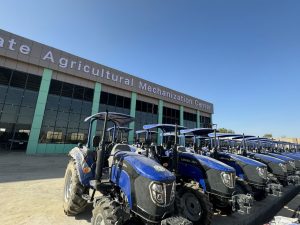President Tinubu to Commission Landmark Agricultural Centre in Katsina
President Bola Ahmed Tinubu is set to commission a landmark agricultural centre i Katsina State on Friday, marking a significant milestone in Nigeria’s pursuit of agricultural transformation and food security. The project, a state-of-the-art hub for agricultural mechanisation and modern farming practices, is expected to play a key role in boosting food production, empowering farmers, and enhancing economic growth in the region.
Katsina State on Friday, marking a significant milestone in Nigeria’s pursuit of agricultural transformation and food security. The project, a state-of-the-art hub for agricultural mechanisation and modern farming practices, is expected to play a key role in boosting food production, empowering farmers, and enhancing economic growth in the region.
The commissioning ceremony will be attended by key federal and state government officials, including the Governor of Katsina State, Malam Dikko Umaru Radda. Governor Radda, who has championed numerous initiatives to improve agricultural productivity in the state, described the project as a “bold step forward” in revolutionising the agricultural sector.

A Catalyst for Agricultural Transformation
The new agricultural centre is designed to serve as a focal point for mechanised farming, agro-processing, training, and research. It will house modern equipment such as tractors, harvesters, irrigation systems, and storage facilities, making it easier for local farmers to access the tools and knowledge needed to improve yields and reduce post-harvest losses.
According to a statement from the Katsina State Ministry of Agriculture, the facility will also host training workshops for farmers on modern farming techniques, soil conservation, climate-smart agriculture, and value chain development. The initiative aligns with President Tinubu’s Renewed Hope Agenda, which prioritises agricultural revitalisation as a means of achieving food security and job creation.
“This centre represents the future of agriculture in Nigeria,” said Alhaji Ibrahim Dikko, Commissioner for Agriculture in Katsina. “By mechanising our farming practices and equipping our farmers with the necessary skills and support, we are laying the foundation for a more prosperous and self-reliant economy.”
Part of a Broader Strategy

The establishment of the agricultural hub is part of a broader strategy by the federal government to modernise agriculture and reduce Nigeria’s dependency on food imports. Over the past two decades, Nigeria has continued to face challenges such as low productivity, limited access to credit, inadequate infrastructure, and climate-induced disruptions. These issues have contributed to food insecurity, especially in rural and conflict-affected areas.
President Tinubu’s administration has pledged to invest in strategic agricultural infrastructure across the country, with the goal of transforming Nigeria into a major player in global food markets. The Katsina centre is one of several similar projects being rolled out under this policy.
“The agricultural sector holds the key to Nigeria’s economic diversification,” said Dr. Aisha Bello, a senior policy adviser at the Federal Ministry of Agriculture and Food Security. “By empowering states like Katsina with the infrastructure and tools they need, the federal government is not only addressing the immediate concerns of food scarcity but also building long-term resilience in the sector.”
Boosting Local Economy and Employment
Beyond its agricultural benefits, the centre is expected to stimulate the local economy and create thousands of direct and indirect jobs. Young people in the state will be able to take advantage of training opportunities in machinery operation, agribusiness management, and value-added processing. Women, who constitute a significant portion of the rural agricultural workforce, will also benefit from targeted empowerment programmes.
Local farmers’ associations have already expressed optimism about the impact of the centre. “This is a dream come true for many of us,” said Mallam Bashir Umar, chairman of the Katsina Farmers’ Cooperative Society. “For years, we’ve struggled with outdated tools and lack of support. With this new centre, we can finally begin to farm with dignity and efficiency.”
Security and Sustainability Considerations
Security has also been a central concern in recent years, with parts of Katsina and neighbouring states affected by banditry and rural violence. In response, the federal and state governments have coordinated efforts to secure farming communities, recognising that agricultural development cannot thrive without peace and stability.
Governor Radda has repeatedly stressed the importance of integrating security measures with development initiatives. As part of the new centre’s rollout, community policing and local vigilance groups will work in tandem with security agencies to safeguard farms, equipment, and infrastructure.
Additionally, sustainability is a key focus of the project. The centre incorporates green technologies such as solar-powered irrigation, rainwater harvesting, and organic waste recycling. These measures aim to minimise environmental degradation while promoting long-term agricultural productivity.
National and International Support
The agricultural hub has garnered support from international development partners, including the African Development Bank (AfDB), the International Fund for Agricultural Development (IFAD), and private sector stakeholders. These partners have provided technical expertise, funding, and equipment to complement the efforts of the federal and state governments.
Dr. Raymond Okeke, a project coordinator with the AfDB, praised the collaborative model used in implementing the project. “This initiative demonstrates what is possible when governments, international donors, and the private sector work together toward a common goal. The potential ripple effect across northern Nigeria is immense,” he said.
Looking Ahead
As President Tinubu prepares to commission the facility on Friday, expectations are high among local stakeholders and agricultural experts. The project is widely seen as a test case for similar developments in other parts of the country. If successful, it could serve as a model for integrated, technology-driven agricultural hubs in Nigeria and beyond.
“The success of this project will depend on effective management, continued investment, and sustained community engagement,” noted Professor Zainab Adamu of the Ahmadu Bello University Department of Agricultural Economics. “But it is undeniably a strong step in the right direction.”
For residents of Katsina and the broader North-West region, the agricultural centre offers more than just modern tools—it represents hope for a better future. A future in which agriculture is no longer synonymous with poverty, but with innovation, dignity, and prosperity.
As Nigeria navigates its path toward food sovereignty and economic resilience, projects like the one in Katsina will be crucial in redefining the nation’s agricultural narrative—one field, one farmer, and one harvest at a time.

